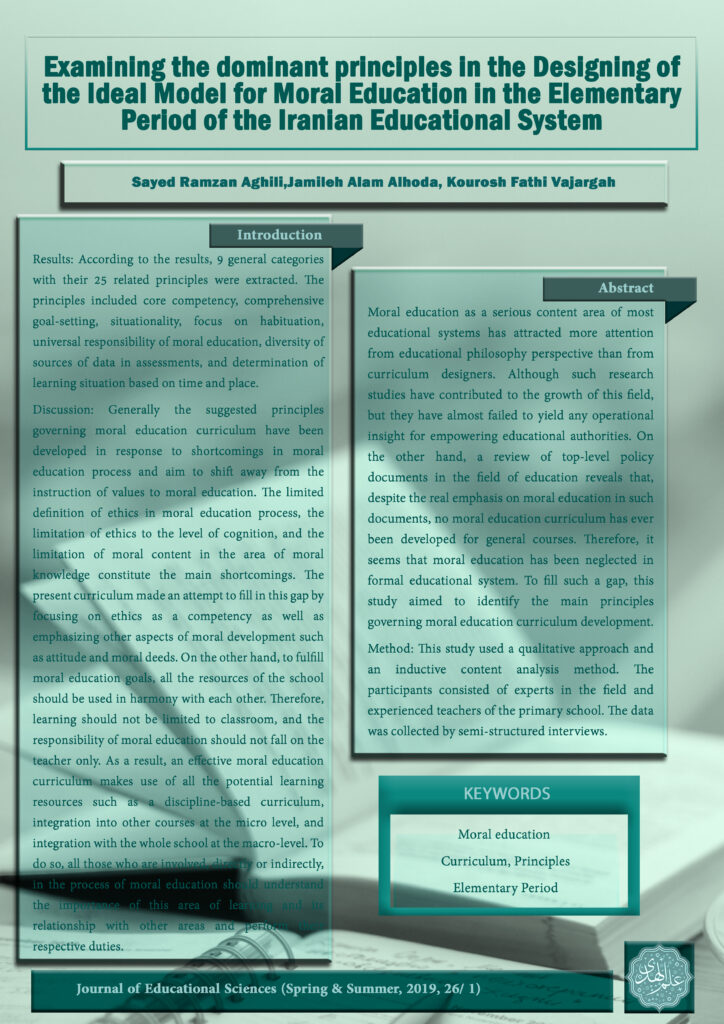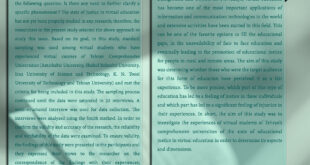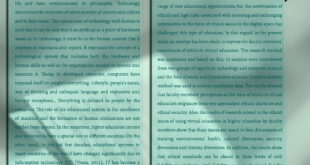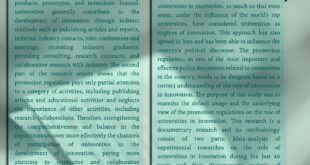Examining the dominant principles in the Designing of the Ideal Model for Moral Education in the Elementary Period of the Iranian Educational System
Sayed Ramzan Aghili*
Jamileh Alam Alhoda**
Kourosh Fathi Vajargah***
* Ph.D. Student in Curriculum Studie, Shahid Beheshti University, Tehran, Iran.
Corresponding Author: aghilinour@gmail.com
** Associate Professor of Philosophy of Education, Shahid Beheshti University Tehran, Iran.
*** Professor of Curriculum Studies, Shahid Beheshti University,Tehran, Iran.
Purpose
Moral education as a serious content area of most educational systems has attracted more attention from educational philosophy perspective than from curriculum designers. Although such research studies have contributed to the growth of this field, but they have almost failed to yield any operational insight for empowering educational authorities. On the other hand, a review of top-level policy documents in the field of education reveals that, despite the real emphasis on moral education in such documents, no moral education curriculum has ever been developed for general courses. Therefore, it seems that moral education has been neglected in formal educational system. To fill such a gap, this study aimed to identify the main principles governing moral education curriculum development.
Method
This study used a qualitative approach and an inductive content analysis method. The participants consisted of experts in the field and experienced teachers of the primary school. The data was collected by semi-structured interviews.
Results
According to the results, 9 general categories with their 25 related principles were extracted. The principles included core competency,
comprehensive goal-setting, situationality, focus on habituation, universal responsibility of moral education, diversity of sources of data in assessments, and determination of learning situation based on time and place.
Discussion
Generally the suggested principles governing moral education curriculum have been developed in response to shortcomings in moral education process and aim to shift away from the instruction of values to moral education. The limited definition of ethics in moral education process, the limitation of ethics to the level of cognition, and the limitation of moral content in the area of moral knowledge constitute the main shortcomings. The present curriculum made an attempt to fill in this gap by focusing on ethics as a competency as well as emphasizing other aspects of moral development such as attitude and moral deeds. On the other hand, to fulfill moral education goals, all the resources of the school should be used in harmony with each other. Therefore, learning should not be limited to classroom, and the responsibility of moral education should not fall on the teacher only. As a result, an effective moral education curriculum makes use of all the potential learning resources such as a discipline-based curriculum, integration into other courses at the micro level, and integration with the whole school at the macro-level. To do so, all those who are involved, directly or indirectly, in the process of moral education should understand the importance of this area of learning and its relationship with other areas and perform their respective duties.
Keywords: Moral education, Curriculum, Principles, Elementary Period.

To download the full article file, click on the link below “Examining the dominant principles in”
 Dr Jamilesadat Alamolhoda Personal Website
Dr Jamilesadat Alamolhoda Personal Website


